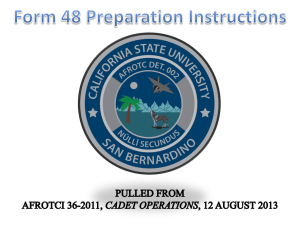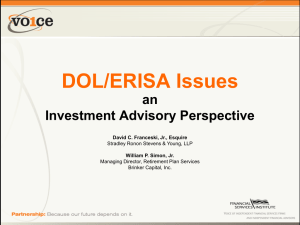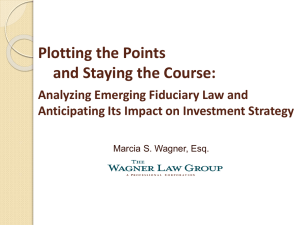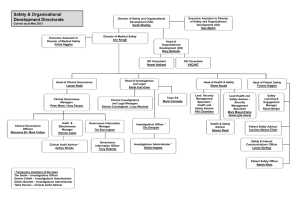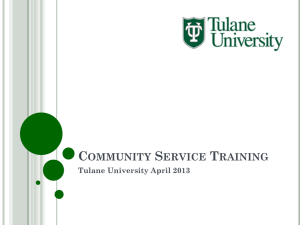Presentation 1 - Church Benefits Association
advertisement
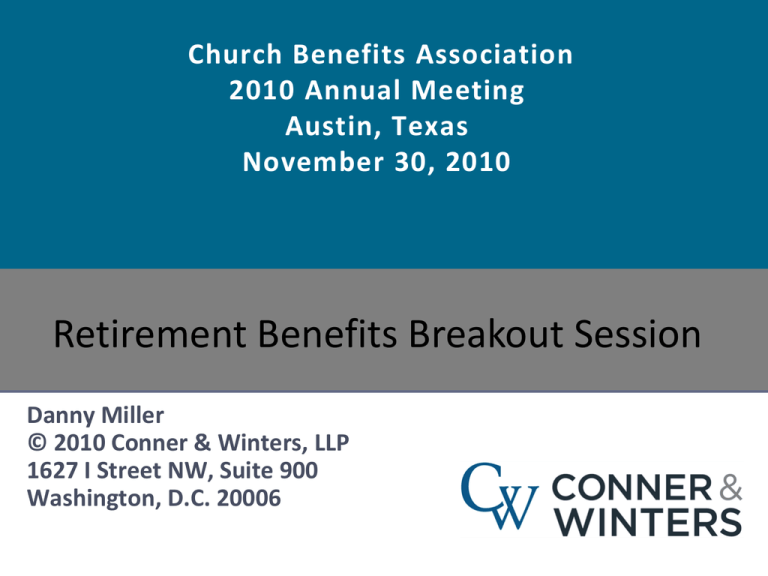
Church Benefits Association 2010 Annual Meeting Austin, Texas November 30, 2010 Retirement Benefits Breakout Session Danny Miller © 2010 Conner & Winters, LLP 1627 I Street NW, Suite 900 Washington, D.C. 20006 CHURCH ALLIANCE LEGISLATION S. 689 (introduced 3/25/2009) includes: • Correction of problem relating to application of controlled group rules to non-QCCOs. • Provision to allow transfers between 403(b)(9) and 401(a) plans. • Provision to preempt state wage withholding laws, permitting auto-enrollment for church pension plans. • Remedy for 415 limit problem that applies to 403(b) defined benefit plans. • Provision to clarify the ability of 403(b)(9) plans to invest in 81-100 trusts. STABLE VALUE FUND LEGISLATION • • • In 2004, the Church Alliance was successful in getting an amendment to the securities law which permitted church plans to invest in collective trusts. Recently, counsel for several investment firms have raised a concern about whether the legislative language works for church 403(b) plans or for church retirement plans with participants who are self-employed ministers. The Church Alliance is attempting to get legislation passed that resolves these issues. 403(B) PROTOTYPE PROGRAM IRS Announcement 2009-34: • Proposed program for approving 403(b) prototype plans which is similar to the opinion letter program for master and prototype 401(a) plans. • Included draft sample language for 403(b) plans. • Proposed program does not include provisions that typically apply to church plans. 403(B) PROTOTYPE PROGRAM IRS Announcement 2009-34 (cont’d): • Provides two different types of plans: – Standardized plan – if plan permits other than elective deferrals, plan must automatically satisfy uniform coverage and contribution standards. – Nonstandardized plan – any plan that is not standardized. IRS Announcement 2009-89 – establishes a remedial amendment period for 403(b) prototype plan adopters. 403(B) PROTOTYPE PROGRAM As noted, proposed program does not include provisions that typically apply to church plans, but – • IRS has informally indicated that the final program will include provisions that typically apply to church plans and provide for the establishment of 403(b)(9) prototype plans. • Prototype program requires that employers execute adoption agreements; this would be a problem for many denominational 403(b) plans. • Final guidance on prototype program is “in clearance” at IRS and Treasury – should be released “soon.” CHURCH PLAN MORATORIUM • Informal moratorium on the issuance of all church plan rulings; has been in effect for several years. • IRS, DOL and PBGC have been re-assessing position on the issuance of church plan rulings. • Possible guidance could : – Address giving retroactive church plan status to DB plans that contain ERISA language and have paid PBGC premiums. – Include a change in the process for a church plan’s making 410(d) election. • Need to watch to see if IRS reconsiders its approach with regard to determining church plan status. EPCRS • Rev. Proc. 2008-50 – Employee Plans Compliance Resolution System (“EPCRS”). • New EPCRS guidance is “in clearance” at IRS and Treasury – should be released “soon.” PUERTO RICAN PLAN ASSETS Revenue Ruling 2008-40 • Permits a transfer from U.S. qualified plan to Puerto Rican plan without creating taxable event for participant. • Transfer must be made on or before December 31, 2010 . • Ruling, by its terms, does not apply to 403(b) plans. Note: IRS is considering whether to apply ruling to 403(b) plans and/or extend transfer relief into 2011. ROTH CONVERSIONS Effective 9/27/2010, in-plan Roth conversions are permitted but only if plan permits . • Survey from PlanSponsor (Sept. 2010) – only 9% of responding plan sponsors were currently planning on providing the option to convert; 9% were not planning to provide the option; 28% were still undecided; and 46% were ineligible (because their plans do not include designated Roth accounts). • As is true for all Roth conversions, taxable portion of distribution is included in gross income in year of the distribution. ROTH CONVERSIONS Notice 2010-84 (issued 11-26-2010): • Provides guidance on treatment of in-plan Roth conversions. • No mandatory 20% withholding required. • Retroactive plan amendments permissible through end of 2011. But in case of 403(b) plans, remedial amendment period available only if employer adopts pre-approved 403(b) plan or applies for individual determination letter. • Plans allowing in-plan Roth conversions may have to revise 402(f) notice provided to individuals receiving eligible rollover distribution. AUGSBURG FORTRESS LITIGATION • Class action brought in U.S. District Court (Minnesota). • Plaintiffs are participants or beneficiaries in DB pension plan. • Defendants are: – Augsburg Fortress Publishers; – Current and former members of Augsburg’s Board of Directors; – Augsburg’s officers; – Pension Plan Committee; and – ELCA. AUGSBURG FORTRESS LITIGATION • Complaint alleges that plan is not a “church plan” and is therefore covered under ERISA. • Complaint alleges that all defendants (including ELCA) are fiduciaries with respect to Augsburg’s DB plan. • Plaintiffs are basically arguing that a single employer cannot maintain a church plan based on their reading of the applicable statute and its legislative history; rather, church plan status is only available through participation in multiple employer denominational plan. INVESTMENT ADVICE Fiduciary Definition: ERISA Section 3(21): A fiduciary is one who: • • Exercises authority or control with respect to the management or disposition of plan assets; or Renders investment advice for a fee or compensation (direct or indirect) with respect to any money or other property of an ERISA-covered plan, or has any authority or responsibility to do so. INVESTMENT ADVICE Education vs. Advice Interpretive Bulletin 96-1: Offering the following items will not constitute the provision of investment advice whether provided by plan sponsor, fiduciary or a service provider: • Information on the plan • General financial and investment information • Asset allocation models • Interactive investment materials INVESTMENT ADVICE Prohibited Transaction Rules: ERISA section 406(b) and Code section 4975 prohibit an investment advisor from recommending investments with respect to which advisor (or its affiliates) will receive additional fees. INVESTMENT ADVICE SunAmerica Advisory Opinion (2001-09A) DOL provided guidance to a representative of SunAmerica with respect to an investment advice program created by SunAmerica for use by retirement plan participants. Program features: • Independent advice required. • Investment portfolio created by independent expert – no investment provider input. • Fees paid to expert investment provider not affected by investment choices. INVESTMENT ADVICE SunAmerica Advisory Opinion (cont’d) Program features (cont’d): • Disclosure to participants required. • Investment provider must be a fiduciary. INVESTMENT ADVICE Other DOL Guidance and PTEs • Fee leveling/fee offset arrangements: Advisor (and affiliate) receive same fees no matter which investment option is selected. – DOL Advisory Opinion 97-15A – DOL Advisory Opinion 2005-10A • Prohibited Transaction Exemption 84-24. • Prohibited Transaction Exemption 77-4. INVESTMENT ADVICE Pension Protection Act of 2006 Effective for 2007 plan years, two statutory prohibited transaction exemptions created permitting the provision of investment advice to participants if a fiduciary/advisor is advising with respect to its own or affiliated funds. • Fee-leveling exemption: No variation in advisor’s fees no matter which investments are selected. • Computer model exemption: Independent third party certification required. INVESTMENT ADVICE REGULATIONS • DOL issued final regulations on Jan. 21, 2009, with effective date of Mar. 23, 2009. • Obama Administration arrives: Effective date of regulations delayed until Nov. 18, 2009. • November, 2009: Final regulations withdrawn by DOL. • Feb. 26, 2010: DOL issues new proposed investment advice regulations, implementing the PPA statutory prohibited transaction exemptions. INVESTMENT ADVICE REGULATIONS Fee leveling exemption: • Advisor cannot receive fees from an affiliate that benefits from the advice as a result of the advisor’s recommendations. • Fees paid to affiliate can vary depending on investment advice chosen. • Advisor must take into account individualized information provided by participant. INVESTMENT ADVICE REGULATIONS Computer Model Exemption: • OK to be created by advisor but must be certified as unbiased by an independent expert. • Individualized participant information must be requested and taken into account. • All investment options under plan must be taken into account other than target date funds, annuity options and brokerage window options. • Recommendations within asset classes not permitted on basis of a factor that cannot confidently be expected to persist in the future. INVESTMENT ADVICE REGULATIONS Conditions applicable to both exemptions: • • • • • Advice program must be authorized by fiduciary unrelated to advisor. Advice based on generally accepted investment theories (active vs. passive management – DOL request for input). Program must take into account fees and expenses. Annual independent audit required. Program not available for managed accounts – recipient of advice must direct its implementation. INVESTMENT ADVICE REGULATIONS Conditions applicable to both exemptions (cont’d): • Written disclosure to plan participants required: – Role of related parties with respect to the creation of the program. – Fees advisor will receive (for advice or from sale of security based on advice). – Advisor is a fiduciary. – Past performance and rates of return of investment options. – Participant can seek advice from a different advisor. • Model disclosure form provided. INVESTMENT ADVICE REGULATIONS Existing administrative/programs to comply with prohibited transaction rules not changed by the PPA: • Impact on SunAmerica advisory opinion? ANDREWS INVESTMENT ADVICE LEGISLATION Conflicted Advice Prohibition Act of 2009 (H.R. 1988) – introduced by Rep. Rob Andrews (D – N.J.) • Included in 401(k) Fair Disclosure and Pension Security Act passed by House Education and Labor Committee on June 24, 2009. • Computer-based advice program –affiliates not permitted to provide one-on-one guidance (must be certified as unbiased by independent third party). ANDREWS INVESTMENT ADVICE LEGISLATION • Also can receive advice from independent advisor who does not manage or provide investment funds for DC plans; advisor’s fees cannot be dependent on investment options selected and cannot come from an entity affiliated with an investment fund holding DC plan assets. • Impact on SunAmerica advisory opinion? FEE DISCLOSURE REGULATIONS • Final regulations issued Oct. 20, 2010, with effective date of Dec. 20, 2010. • Plan administrators must disclose following “planrelated” information to participants: – General plan information. – Administrative expense information. – Individual expense information. FEE DISCLOSURE REGULATIONS • Plan administrators must also disclose following investment-related information: – – – – • name and category of the designated investment alternative performance data for each designated investment alternative fees and expenses associated with certain investment alternatives website address where participants may find additional information about each alternative. Plan fiduciaries must disclose the required information in a chart or similar format that allows for comparison of the alternatives. FEE DISCLOSURE REGULATIONS • The information must be provided to participants on or before the date they can first direct their plan investments and annually thereafter. • Plan administrator must disclose the actual administrative expenses and actual individual expenses charged against a participant’s account to participants at least quarterly. SERVICE PROVIDER DISCLOSURES • Interim final regulations issued July 16, 2010, with effective date of July 16, 2011 • Rules apply to service providers that enter into a contract or arrangement with a retirement plan under which the service provider reasonably expects to receive $1,000 or more in direct or indirect compensation. SERVICE PROVIDER DISCLOSURES • Prior to entering into a contract or arrangement with a plan, service provider must disclose: – A description of the services to be provided to the plan; – A statement that the service provider (and affiliates or subcontractors) will be providing services to the plan as a fiduciary; – A description of all direct and indirect compensation to be received by the service provider (and affiliates or subcontractors), including any compensation that will be received if the contract or arrangement is terminated; SERVICE PROVIDER DISCLOSURES • Prior to entering into a contract or arrangement with a plan, service provider must disclose (cont’d): – If recordkeeping services will be provided to the plan, a description of all direct and indirect compensation attributable to such services; – A description of how the compensation will be paid; and – A description of any investment management or similar fees charged against investment returns. SERVICE PROVIDER DISCLOSURES • Must disclose any changes to the information described above to the plan fiduciary no later than 60 days after the service provider is informed of such change. • Rules also require service providers to disclose information necessary to satisfy ERISA’s reporting and disclosure requirements upon the request of a plan fiduciary or plan administrator.



